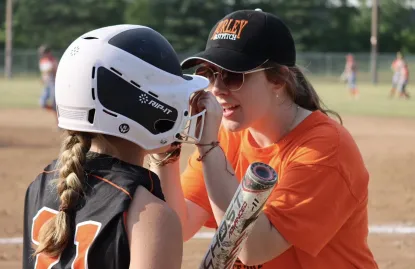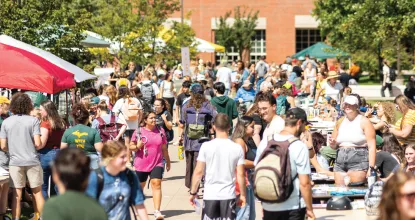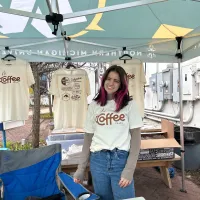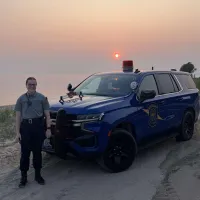Overview
Superior Edge is a student development program at Northern Michigan University that provides students with the opportunity to combine in- and out-of-the-classroom experiences in a way that will provide them with an edge with employers or graduate school admissions counselors. Superior Edge was developed as a university-wide initiative by a committee comprised of faculty, staff, and students. Superior Edge develops citizen-leaders for the 21st century.
Students who participate in Superior Edge make new friends, build community contacts and a great resume, formalize the recognition of activities they participate in, enhance the ability to relate theory to practice, and more.
Superior Edge consists of four “edges”
- Citizenship – Become an engaged, involved citizen
- Diverse Perspectives and Experiences – Develop sensitivity and awareness of global and domestic issues
- Leadership – Become a competent, ethical and effective leader
- Real World – Relate classroom theory to workplace practice in real-world settings
To complete an edge, you document 100 hours of relevant activities/experiences and write a reflection paper/schedule an interview with one of our staff members articulating what you have learned through the process as well as complete a short survey.
After completing an edge, a student enrichment transcript documents each edge. Click here to see how to access it. If you finish all four edges, you get the distinction of having the "Superior Edge" and get to wear cords at commencement.
Characteristics of Superior Edge:
- Participation is open to every student at Northern Michigan University.
- Students can progress at their own pace; progress towards an edge can be made throughout their years at NMU.
- Superior Edge combines in- and out-of-the-classroom experiences.
- Students can choose their level of participation; they can elect to complete one, two, three, or all four edges for the Superior Edge.
Why Volunteer
With the right information, resources, and support from the Volunteer Center, everyone can find the perfect volunteer opportunity. The benefits of volunteering are evident:
- Flexible time commitment
- Learn new skills
- Meet new people
- Learn about your community
- Build marketable skills
- Reduce stress
- Makes you feel good
- Great resume builder
Volunteering as a student organization or sports club is also easy and fun:
- Help your local community
- Personal improvement of individual members
- Group building: when organization members volunteer together, they experience qualities that build a strong group bond.
- Recognition: there is no better way to advertise an organization than to volunteer! It is easy, free, and shows you care about being part of the local community.
- Awards: student organizations that show a commitment to volunteering can be nominated for the Community Service Award that is awarded at the Leadership Recognition Banquet.
Check out The Hub NMU for volunteer opportunities.

How Do I Join?
To get started with Superior Edge, you will attend a 30-minute orientation session where criteria for the program is explained, and you will receive instruction on logging your hours.
How Do I Log Hours?
Students can log hours through a link in their MyNMU account. Simply log in, navigate to the Student Services tab, and you can find the Superior Edge logging link in the middle column.
Once you are in the Superior Edge system, follow directions to log hours in the correct edge.

The Edges

Citizenship Edge
Students will become engaged, involved citizens. They will:
- Develop an empathy and concern for others
- Gain practical experience in community settings
- Increase their awareness of community challenges, opportunities, and processes
To satisfactorily achieve the outcome, students will complete:
- 100 hours that may include a combination of service learning, community service, and civic engagement. A minimum of 10 hours must be civic engagement activities, and students will need to participate in 3 separate volunteer activities.
- Log your hours on the Superior Edge logging system
- Write a reflection paper/schedule an interview with one of our staff members and complete a short survey
Examples of what would count towards completion of the Citizenship Edge:
- service learning: course-related experiences
- community service: volunteer opportunities
- civic engagement: attending or working on a community/political campaign; attending governmental, ASNMU, non-profit board (i.e., NMU Board of Trustees, etc.) meetings; attending public hearings; school board/PTA meetings; jury duty; working at an election, etc.
Possible Citizenship Edge Activities:
- Personal volunteer projects such as Adopt-A-Family, Adopt-A-Highway, Big Brothers Big Sisters, food pantries, Habitat for Humanity, hospice, Humane Society, Make A Difference Day, Red Cross, Special Olympics, U.P. 200 Sled Dog Race, or being a mentor
- Hold a position in a student organization to promote volunteer work (i.e., volunteer coordinator for residence hall)
- Organize volunteer programs/opportunities
- Work in an academic service learning course
- Travel abroad to volunteer

Diverse Perspectives & Experiences Edge
Students will develop a world view and better understand and appreciate differences. They will:
- Develop an appreciation for domestic differences
- Develop an appreciation for international differences
- Increase knowledge of different cultures in the United States and around the world
- Better understand global issues
To satisfactorily achieve the outcome, students will complete:
- 100 hours that will include a combination of domestic and international differences (a minimum of at least 20 hours in each area)
- Log your hours on the Superior Edge logging system
- Write a reflection paper/schedule an interview with one of our staff members and complete a short survey
Examples of what would count towards completion of the Diverse Perspectives and Experiences Edge:
- domestic differences: attend presentations, workshops, or programs; participate in events such as Indigenousness People's Day, Martin Luther King, Jr Day of Service, Pow Wow, or the United Conference; experiences at a soup kitchen; working at Bay Cliff Health Camp; tutoring at Lake Superior Village; working with the elderly; student exchange programs
- international differences: study/travel abroad or attend presentations, workshops, programs, or events
Possible Diverse Perspectives & Experiences Edge Activities:
Participate in programs having to do with differences
- Attend Skill Builder! workshops or other workshops dealing with differences
- Become a member of a student organization different from you (something out of your comfort zone): Asian Student Union, Black Student Union, Diversity in Disability, Feminism for All, German Club, Latinx Student Union, Native American Student Association, Queers & Allies, etc.
- Volunteer experience in different neighborhoods, cities, or countries
- Study or live abroad
- Take extra courses beyond the world cultures requirement

Leadership Edge
Students will grow as competent, ethical, and effective leaders. They will:
- Appreciate the ethical underpinnings of effective leadership
- Understand group dynamics and processes
- Develop an awareness of personal leadership strengths and weaknesses
- Attain the knowledge of different leadership styles and approaches
To satisfactorily achieve the outcome, students will complete:
- 100 hours that includes a combination of theory, ethics, and experience. A minimum of 50 hours must be leadership experience.
- Log your hours on the Superior Edge logging system
- Write a reflection paper/schedule an interview with one of our staff members and complete a short survey
Examples of what would count towards completion of the Leadership Edge:
- theory: courses, workshops, or conferences with leadership theory. Theory must be learned in a formal setting.
- ethics: complete courses or course content, participate in presentations or workshops on ethics. Ethics must be learned in a formal setting.
- experience: leadership role in a student or community organization, resident adviser (RA), Student Leader Fellowship Program (SLFP), ROTC, employment with leadership responsibilities
Possible Leadership Edge Activities:
- Position on a committee or in a student organization
- Leadership Skill Builder! workshops
- Leadership theory class
- Residence hall leadership positions
- Organize talk/guest speaker (house/hall/Platform Personalities)
- Be a resident adviser or community adviser
- Hold a supervisory position at your place of employment

Real World Edge
Students will demonstrate the ability to relate theory to practice. They will:
- Develop an appreciation for the many factors (resources, personalities, competing priorities, etc.) involved in “real world” situations related to either your major or minor
- Develop the confidence needed to succeed in your future career and community opportunities
- Better integrate theory from a student’s major or minor into practice outside of the classroom setting
To satisfactorily achieve the outcome, students will complete:
- 100 hours that may include a combination of service learning, research experiences, work experience, internships or professional activities
- Log your hours on the Superior Edge logging system
- Write a reflection paper/schedule an interview with one of our staff members and complete a short survey
Examples of what would count towards completion of the Real World Edge:
- service learning courses: in the syllabi it should state how many hours a student will receive
- research experiences: Freshman Fellows, apprenticeships, working with a faculty member, etc.
- related work experience: an early childhood student working at a daycare, a graphic design student working in a design office, an accounting major working at a CPA firm, etc.
- internships/practica/apprenticeships/field work
- professional activities: attending or presenting at a professional conference
Possible Real World Activities:
- Internship/employment related to your major or minor
- Academic student organization associated with your major or minor
- Volunteer for an organization associated with your major or minor
- Attend workshops/conferences associated with your major
- A chairperson on a board pertaining to your major or minor
- Work with professors, graduate assistants or teaching assistants on extra projects pertaining to your major or minor



